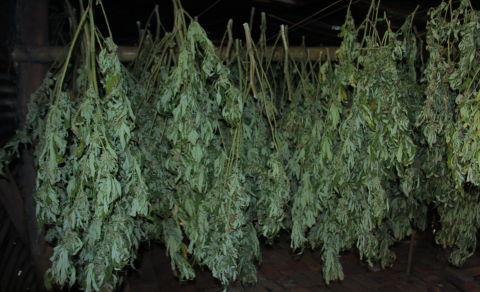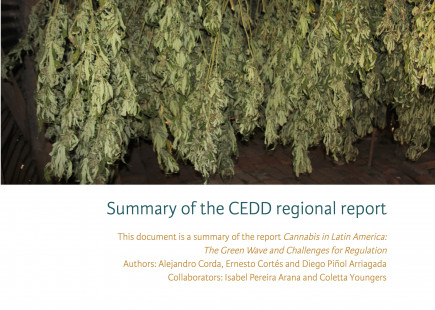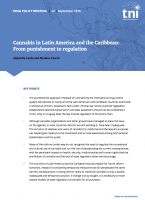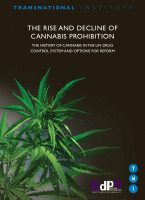Cannabis in Latin America The Green Wave and Challenges for Regulation
Topics
Regions
This research by the Research Consortium on Drugs and the Law (Colectivo de Estudios Drogas y Derecho, CEDD) analyzes a duality facing Latin America: the prohibitionist discourse and its effects on human rights persist, alongside reforms to laws and policies related to the use of cannabis.

Find the report here.
At the international and regional levels, Latin America has been at the forefront of efforts to promote debate over the failure of the prohibitionist paradigm and the need to explore alternative approaches. In addition, the Americas have initiated reforms of cannabis laws and policies and have opened paths to regulation, which began in Uruguay. However, the current regional panorama reveals that the trend towards the criminalization of cannabis and its associated behaviors remains the norm, including administrative and criminal sanctions.

A new report, Cannabis in Latin America: The Green Wave and Challenges for Regulations, addresses these topics. It is the result of two years of research by the Research Consortium on Drugs and the Law—a group of researchers from 11 countries of the Americas, the Washington Office for Latin America (WOLA), and the Transnational Institute (TNI). While the full report is available only in Spanish, a summary in English can be found here.
The report brings a regional perspective to analyze the ways in which punitive drug laws disproportionately affect cannabis users, growers, and small-scale sellers. In addition, it shows the legislative and electoral advances achieved in some countries, which mark the path towards reform in the region.
In 2013, Uruguay became the first country to pass legislation creating a national legal market for medical and non-medical cannabis, and in 2018 Canada became the first G-7 country to regulate non-medical cannabis for adult use. Mexico seems to be committed to a similar course in 2020, with the support of the government of President Andrés Manuel López Obrador.
The United States has influenced these transformations in Latin America. Since 2012, eleven states and the District of Columbia have approved ballot initiatives and laws to regulate cannabis for non-medical uses (adult or “recreational” uses), even though federal law continues to prohibit any activity related to this plant.
At the same time, medical cannabis is growing by leaps and bounds. In the United States, 33 of the 50 states and the District of Columbia allow the use of cannabis for medical purposes. This use has been legal in Canada since 2001. In Latin America, some form of medical cannabis is allowed in Argentina, Brazil, Chile, Colombia, Mexico, Paraguay, Peru, and Uruguay. Ecuador has reformed its Criminal Code, which opens the door to developing access to cannabis for “therapeutic, palliative or medicinal” purposes. Caribbean countries are also reviewing their cannabis laws. For instance, in 2015, Jamaica reformed its laws to decriminalize possession, allow the cultivation of up to five plants, and authorize the use for religious and medicinal purposes.
This research also shows—from different angles—that cannabis prohibition has failed: not only has it not achieved its own objective, but it has also generated side effects and costs in terms of human rights.
For people in countries where legal markets do not yet exist, the consequences of being detained with any amount of cannabis can be severe. Previous CEDD studies have shown that—throughout the region—people who use cannabis face stigmatization and harassment by the police, and are often detained for the cultivation of plants or simple possession of the substance. In several of the countries studied, cannabis users constitute a significant percentage of people affected by criminal drug laws. In summary, the harsh and disproportionate laws related to cannabis in the region cause significant damage to people, their families, their communities, and society in general.
This overview is an urgent call to recognize the damage caused by current policies, as well as to explore political measures and rules based on scientific evidence, and on the principles of human rights, public health, and sustainable development. Legal and regulated markets—based on these principles—have the potential to repair damage and improve living conditions for populations that are involved with cannabis.
Read the report.
Previous CEDD reports can be found here.


